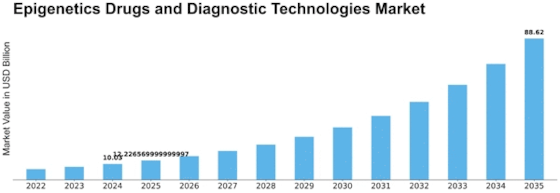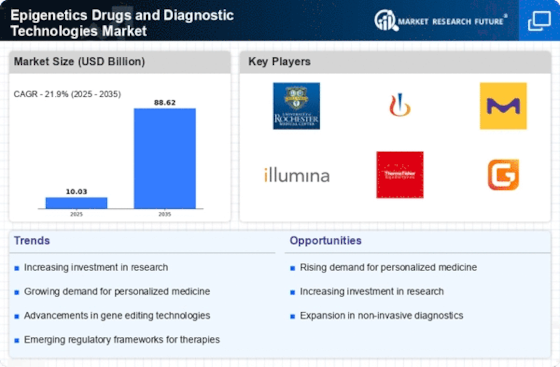-
EXECUTIVE SUMMARY
-
MARKET INTRODUCTION
-
Definition
-
Scope of the Study
- Research Objective
- Assumptions
- Limitations
-
RESEARCH METHODOLOGY
-
Overview
-
Data Mining
-
Secondary Research
-
Primary Research
- Primary Interviews and Information Gathering Process
- Breakdown of Primary Respondents
-
Forecasting Technique
-
Market Size Estimation
- Bottom-Up Approach
- Top-Down Approach
-
Data Triangulation
-
Validation
-
MARKET DYNAMICS
-
Overview
-
Drivers
-
Restraints
-
Opportunities
-
MARKET FACTOR ANALYSIS
-
Value Chain Analysis
-
Porter’s Five Forces Analysis
- Bargaining Power of Suppliers
- Bargaining Power of Buyers
- Threat of New Entrants
- Threat of Substitutes
- Intensity of Rivalry
-
COVID-19 Impact Analysis
- Market Impact Analysis
- Regional Impact
- Opportunity and Threat Analysis
-
GLOBAL EPIGENETICS DRUGS AND DIAGNOSTIC TECHNOLOGIES MARKET, BY DRUG TYPE
-
Overview
-
DNA Methyltransferases (DNMTs) Inhibitors
- Azacitidine
- Decitabine
- Others
-
Histone Deacetylases (HDACs) Inhibitors
- Vorinostat
- Romidepsin
- Others
-
Histone Methyltransferase (HMT) inhibitors
-
Others
-
GLOBAL EPIGENETICS DRUGS AND DIAGNOSTIC TECHNOLOGIES MARKET, BY DIAGNOSTIC TECHNOLOGIES
-
Overview
-
DNA Methylation
-
Histone Modification Analysis
-
Others
-
GLOBAL EPIGENETICS DRUGS AND DIAGNOSTIC TECHNOLOGIES MARKET, BY APPLICATION
-
Overview
-
Oncology
-
Neurology
-
Autoimmune Diseases
-
Others
-
GLOBAL EPIGENETICS DRUGS AND DIAGNOSTIC TECHNOLOGIES MARKET, BY END USER
-
Overview
-
Hospitals & Clinics
-
Diagnostic Laboratories
-
Others
-
GLOBAL EPIGENETICS DRUGS AND DIAGNOSTIC TECHNOLOGIES MARKET, BY REGION
-
Overview
-
North America
- US
- Canada
-
Europe
- Germany
- France
- UK
- Italy
- Spain
- Rest of Europe
-
Asia-Pacific
- China
- India
- Japan
- South Korea
- Australia
- Rest of Asia-Pacific
-
Rest of the World
- Middle East
- Africa
- Latin America
-
COMPANY LANDSCAPE
-
Overview
-
Competitive Analysis
-
Market Share Analysis
-
Major Growth Strategy in the Global Epigenetics Drugs and Diagnostic Technologies Market
-
Competitive Benchmarking
-
Leading Players in Terms of Number of Developments in the Global Epigenetics Drugs and Diagnostic Technologies Market
-
Key developments and Growth Strategies
- New Product Launch
- Merger & Acquisitions
- Joint Ventures
-
Major Players Financial Matrix
- Sales & Operating Income, 2022
- Major Players R&D Expenditure. 2022
-
COMPANY PROFILES
-
Hologic, Inc.
- Company Overview
- Financial Overview
- Products Offered
- Key Developments
- SWOT Analysis
- Key Strategies
-
Gilead Sciences, Inc.
- Company Overview
- Financial Overview
- Products Offered
- Key Developments
- SWOT Analysis
- Key Strategies
-
Celleron Therapeutics
- Company Overview
- Financial Overview
- Products Offered
- Key Developments
- SWOT Analysis
- Key Strategies
-
Illumina, Inc.
- Company Overview
- Financial Overview
- Products Offered
- Key Developments
- SWOT Analysis
- Key Strategies
-
AstraZeneca PLC
- Company Overview
- Financial Overview
- Products Offered
- Key Developments
- SWOT Analysis
- Key Strategies
-
LISEN lmprinting Diagnostics
- Company Overview
- Financial Overview
- Products Offered
- Key Developments
- SWOT Analysis
- Key Strategies
-
Salarius Pharmaceuticals, Inc.
- Company Overview
- Financial Overview
- Products Offered
- Key Developments
- SWOT Analysis
- Key Strategies
-
Jubilant Therapeutics
- Company Overview
- Financial Overview
- Products Offered
- Key Developments
- SWOT Analysis
- Key Strategies
-
Oryzon Genomics
- Company Overview
- Financial Overview
- Products Offered
- Key Developments
- SWOT Analysis
- Key Strategies
-
Epiaxis Therapeutics
- Company Overview
- Financial Overview
- Products Offered
- Key Developments
- SWOT Analysis
- Key Strategies
-
APPENDIX
-
References
-
Related Reports
-
-
LIST OF TABLES
-
GLOBAL EPIGENETICS DRUGS AND DIAGNOSTIC TECHNOLOGIES MARKET, SYNOPSIS, 2019–2032
-
GLOBAL EPIGENETICS DRUGS AND DIAGNOSTIC TECHNOLOGIES MARKET, ESTIMATES & FORECAST, 2019–2032 (USD BILLION)
-
GLOBAL EPIGENETICS DRUGS AND DIAGNOSTIC TECHNOLOGIES MARKET, BY DRUG TYPE, 2019–2032 (USD BILLION)
-
GLOBAL EPIGENETICS DRUGS AND DIAGNOSTIC TECHNOLOGIES MARKET, BY DNA METHYLTRANSFERASES (DNMTS) INHIBITORS, BY TYPE, 2019–2032 (USD BILLION)
-
GLOBAL EPIGENETICS DRUGS AND DIAGNOSTIC TECHNOLOGIES MARKET, BY HISTONE DEACETYLASES (HDACS) INHIBITORS, BY TYPE, 2019–2032 (USD BILLION)
-
GLOBAL EPIGENETICS DRUGS AND DIAGNOSTIC TECHNOLOGIES MARKET, BY DIAGNOSTIC TECHNOLOGIES, 2019–2032 (USD BILLION)
-
GLOBAL EPIGENETICS DRUGS AND DIAGNOSTIC TECHNOLOGIES MARKET, BY APPLICATION, 2019–2032 (USD BILLION)
-
GLOBAL EPIGENETICS DRUGS AND DIAGNOSTIC TECHNOLOGIES MARKET, BY END USER, 2019–2032 (USD BILLION)
-
NORTH AMERICA: EPIGENETICS DRUGS AND DIAGNOSTIC TECHNOLOGIES MARKET, BY DRUG TYPE, 2019–2032 (USD BILLION)
-
NORTH AMERICA: EPIGENETICS DRUGS AND DIAGNOSTIC TECHNOLOGIES MARKET, BY DNA METHYLTRANSFERASES (DNMTS) INHIBITORS, BY TYPE, 2019–2032 (USD BILLION)
-
NORTH AMERICA: EPIGENETICS DRUGS AND DIAGNOSTIC TECHNOLOGIES MARKET, BY HISTONE DEACETYLASES (HDACS) INHIBITORS, BY TYPE, 2019–2032 (USD BILLION)
-
NORTH AMERICA: EPIGENETICS DRUGS AND DIAGNOSTIC TECHNOLOGIES MARKET, BY DIAGNOSTIC TECHNOLOGIES, 2019–2032 (USD BILLION)
-
NORTH AMERICA: EPIGENETICS DRUGS AND DIAGNOSTIC TECHNOLOGIES MARKET, BY APPLICATION, 2019–2032 (USD BILLION)
-
NORTH AMERICA: EPIGENETICS DRUGS AND DIAGNOSTIC TECHNOLOGIES MARKET, BY END USER, 2019–2032 (USD BILLION)
-
US: EPIGENETICS DRUGS AND DIAGNOSTIC TECHNOLOGIES MARKET, BY DRUG TYPE, 2019–2032 (USD BILLION)
-
US: EPIGENETICS DRUGS AND DIAGNOSTIC TECHNOLOGIES MARKET, BY DNA METHYLTRANSFERASES (DNMTS) INHIBITORS, BY TYPE, 2019–2032 (USD BILLION)
-
US: EPIGENETICS DRUGS AND DIAGNOSTIC TECHNOLOGIES MARKET, BY HISTONE DEACETYLASES (HDACS) INHIBITORS, BY TYPE, 2019–2032 (USD BILLION)
-
US: EPIGENETICS DRUGS AND DIAGNOSTIC TECHNOLOGIES MARKET, BY DIAGNOSTIC TECHNOLOGIES, 2019–2032 (USD BILLION)
-
US: EPIGENETICS DRUGS AND DIAGNOSTIC TECHNOLOGIES MARKET, BY APPLICATION, 2019–2032 (USD BILLION)
-
US: EPIGENETICS DRUGS AND DIAGNOSTIC TECHNOLOGIES MARKET, BY END USER, 2019–2032 (USD BILLION)
-
CANADA: EPIGENETICS DRUGS AND DIAGNOSTIC TECHNOLOGIES MARKET, BY DRUG TYPE, 2019–2032 (USD BILLION)
-
CANADA: EPIGENETICS DRUGS AND DIAGNOSTIC TECHNOLOGIES MARKET, BY DNA METHYLTRANSFERASES (DNMTS) INHIBITORS, BY TYPE, 2019–2032 (USD BILLION)
-
CANADA: EPIGENETICS DRUGS AND DIAGNOSTIC TECHNOLOGIES MARKET, BY HISTONE DEACETYLASES (HDACS) INHIBITORS, BY TYPE, 2019–2032 (USD BILLION)
-
CANADA: EPIGENETICS DRUGS AND DIAGNOSTIC TECHNOLOGIES MARKET, BY DIAGNOSTIC TECHNOLOGIES, 2019–2032 (USD BILLION)
-
CANADA: EPIGENETICS DRUGS AND DIAGNOSTIC TECHNOLOGIES MARKET, BY APPLICATION, 2019–2032 (USD BILLION)
-
CANADA: EPIGENETICS DRUGS AND DIAGNOSTIC TECHNOLOGIES MARKET, BY END USER, 2019–2032 (USD BILLION)
-
EUROPE: EPIGENETICS DRUGS AND DIAGNOSTIC TECHNOLOGIES MARKET, BY DRUG TYPE, 2019–2032 (USD BILLION)
-
EUROPE: EPIGENETICS DRUGS AND DIAGNOSTIC TECHNOLOGIES MARKET, BY DNA METHYLTRANSFERASES (DNMTS) INHIBITORS, BY TYPE, 2019–2032 (USD BILLION)
-
EUROPE: EPIGENETICS DRUGS AND DIAGNOSTIC TECHNOLOGIES MARKET, BY HISTONE DEACETYLASES (HDACS) INHIBITORS, BY TYPE, 2019–2032 (USD BILLION)
-
EUROPE: EPIGENETICS DRUGS AND DIAGNOSTIC TECHNOLOGIES MARKET, BY DIAGNOSTIC TECHNOLOGIES, 2019–2032 (USD BILLION)
-
EUROPE: EPIGENETICS DRUGS AND DIAGNOSTIC TECHNOLOGIES MARKET, BY APPLICATION, 2019–2032 (USD BILLION)
-
EUROPE: EPIGENETICS DRUGS AND DIAGNOSTIC TECHNOLOGIES MARKET, BY END USER, 2019–2032 (USD BILLION)
-
GERMANY: EPIGENETICS DRUGS AND DIAGNOSTIC TECHNOLOGIES MARKET, BY DRUG TYPE, 2019–2032 (USD BILLION)
-
GERMANY: EPIGENETICS DRUGS AND DIAGNOSTIC TECHNOLOGIES MARKET, BY DNA METHYLTRANSFERASES (DNMTS) INHIBITORS, BY TYPE, 2019–2032 (USD BILLION)
-
GERMANY: EPIGENETICS DRUGS AND DIAGNOSTIC TECHNOLOGIES MARKET, BY HISTONE DEACETYLASES (HDACS) INHIBITORS, BY TYPE, 2019–2032 (USD BILLION)
-
GERMANY: EPIGENETICS DRUGS AND DIAGNOSTIC TECHNOLOGIES MARKET, BY DIAGNOSTIC TECHNOLOGIES, 2019–2032 (USD BILLION)
-
GERMANY: EPIGENETICS DRUGS AND DIAGNOSTIC TECHNOLOGIES MARKET, BY APPLICATION, 2019–2032 (USD BILLION)
-
GERMANY: EPIGENETICS DRUGS AND DIAGNOSTIC TECHNOLOGIES MARKET, BY END USER, 2019–2032 (USD BILLION)
-
FRANCE: EPIGENETICS DRUGS AND DIAGNOSTIC TECHNOLOGIES MARKET, BY DRUG TYPE, 2019–2032 (USD BILLION)
-
FRANCE: EPIGENETICS DRUGS AND DIAGNOSTIC TECHNOLOGIES MARKET, BY DNA METHYLTRANSFERASES (DNMTS) INHIBITORS, BY TYPE, 2019–2032 (USD BILLION)
-
FRANCE: EPIGENETICS DRUGS AND DIAGNOSTIC TECHNOLOGIES MARKET, BY HISTONE DEACETYLASES (HDACS) INHIBITORS, BY TYPE, 2019–2032 (USD BILLION)
-
FRANCE: EPIGENETICS DRUGS AND DIAGNOSTIC TECHNOLOGIES MARKET, BY DIAGNOSTIC TECHNOLOGIES, 2019–2032 (USD BILLION)
-
FRANCE: EPIGENETICS DRUGS AND DIAGNOSTIC TECHNOLOGIES MARKET, BY APPLICATION, 2019–2032 (USD BILLION)
-
FRANCE: EPIGENETICS DRUGS AND DIAGNOSTIC TECHNOLOGIES MARKET, BY END USER, 2019–2032 (USD BILLION)
-
ITALY: EPIGENETICS DRUGS AND DIAGNOSTIC TECHNOLOGIES MARKET, BY DRUG TYPE, 2019–2032 (USD BILLION)
-
ITALY: EPIGENETICS DRUGS AND DIAGNOSTIC TECHNOLOGIES MARKET, BY DNA METHYLTRANSFERASES (DNMTS) INHIBITORS, BY TYPE, 2019–2032 (USD BILLION)
-
ITALY: EPIGENETICS DRUGS AND DIAGNOSTIC TECHNOLOGIES MARKET, BY HISTONE DEACETYLASES (HDACS) INHIBITORS, BY TYPE, 2019–2032 (USD BILLION)
-
ITALY: EPIGENETICS DRUGS AND DIAGNOSTIC TECHNOLOGIES MARKET, BY DIAGNOSTIC TECHNOLOGIES, 2019–2032 (USD BILLION)
-
ITALY: EPIGENETICS DRUGS AND DIAGNOSTIC TECHNOLOGIES MARKET, BY APPLICATION, 2019–2032 (USD BILLION)
-
ITALY: EPIGENETICS DRUGS AND DIAGNOSTIC TECHNOLOGIES MARKET, BY END USER, 2019–2032 (USD BILLION)
-
SPAIN: EPIGENETICS DRUGS AND DIAGNOSTIC TECHNOLOGIES MARKET, BY DRUG TYPE, 2019–2032 (USD BILLION)
-
SPAIN: EPIGENETICS DRUGS AND DIAGNOSTIC TECHNOLOGIES MARKET, BY DNA METHYLTRANSFERASES (DNMTS) INHIBITORS, BY TYPE, 2019–2032 (USD BILLION)
-
SPAIN: EPIGENETICS DRUGS AND DIAGNOSTIC TECHNOLOGIES MARKET, BY HISTONE DEACETYLASES (HDACS) INHIBITORS, BY TYPE, 2019–2032 (USD BILLION)
-
SPAIN: EPIGENETICS DRUGS AND DIAGNOSTIC TECHNOLOGIES MARKET, BY DIAGNOSTIC TECHNOLOGIES, 2019–2032 (USD BILLION)
-
SPAIN: EPIGENETICS DRUGS AND DIAGNOSTIC TECHNOLOGIES MARKET, BY APPLICATION, 2019–2032 (USD BILLION)
-
SPAIN: EPIGENETICS DRUGS AND DIAGNOSTIC TECHNOLOGIES MARKET, BY END USER, 2019–2032 (USD BILLION)
-
UK: EPIGENETICS DRUGS AND DIAGNOSTIC TECHNOLOGIES MARKET, BY DRUG TYPE, 2019–2032 (USD BILLION)
-
UK: EPIGENETICS DRUGS AND DIAGNOSTIC TECHNOLOGIES MARKET, BY DNA METHYLTRANSFERASES (DNMTS) INHIBITORS, BY TYPE, 2019–2032 (USD BILLION)
-
UK: EPIGENETICS DRUGS AND DIAGNOSTIC TECHNOLOGIES MARKET, BY HISTONE DEACETYLASES (HDACS) INHIBITORS, BY TYPE, 2019–2032 (USD BILLION)
-
UK: EPIGENETICS DRUGS AND DIAGNOSTIC TECHNOLOGIES MARKET, BY DIAGNOSTIC TECHNOLOGIES, 2019–2032 (USD BILLION)
-
UK: EPIGENETICS DRUGS AND DIAGNOSTIC TECHNOLOGIES MARKET, BY APPLICATION, 2019–2032 (USD BILLION)
-
UK: EPIGENETICS DRUGS AND DIAGNOSTIC TECHNOLOGIES MARKET, BY END USER, 2019–2032 (USD BILLION)
-
REST OF EUROPE: EPIGENETICS DRUGS AND DIAGNOSTIC TECHNOLOGIES MARKET, BY DRUG TYPE, 2019–2032 (USD BILLION)
-
REST OF EUROPE: EPIGENETICS DRUGS AND DIAGNOSTIC TECHNOLOGIES MARKET, BY DNA METHYLTRANSFERASES (DNMTS) INHIBITORS, BY TYPE, 2019–2032 (USD BILLION)
-
REST OF EUROPE: EPIGENETICS DRUGS AND DIAGNOSTIC TECHNOLOGIES MARKET, BY HISTONE DEACETYLASES (HDACS) INHIBITORS, BY TYPE, 2019–2032 (USD BILLION)
-
REST OF EUROPE: EPIGENETICS DRUGS AND DIAGNOSTIC TECHNOLOGIES MARKET, BY DIAGNOSTIC TECHNOLOGIES, 2019–2032 (USD BILLION)
-
REST OF EUROPE: EPIGENETICS DRUGS AND DIAGNOSTIC TECHNOLOGIES MARKET, BY APPLICATION, 2019–2032 (USD BILLION)
-
REST OF EUROPE: EPIGENETICS DRUGS AND DIAGNOSTIC TECHNOLOGIES MARKET, BY END USER, 2019–2032 (USD BILLION)
-
ASIA-PACIFIC: EPIGENETICS DRUGS AND DIAGNOSTIC TECHNOLOGIES MARKET, BY DRUG TYPE, 2019–2032 (USD BILLION)
-
ASIA-PACIFIC: EPIGENETICS DRUGS AND DIAGNOSTIC TECHNOLOGIES MARKET, BY DNA METHYLTRANSFERASES (DNMTS) INHIBITORS, BY TYPE, 2019–2032 (USD BILLION)
-
ASIA-PACIFIC: EPIGENETICS DRUGS AND DIAGNOSTIC TECHNOLOGIES MARKET, BY HISTONE DEACETYLASES (HDACS) INHIBITORS, BY TYPE, 2019–2032 (USD BILLION)
-
ASIA-PACIFIC: EPIGENETICS DRUGS AND DIAGNOSTIC TECHNOLOGIES MARKET, BY DIAGNOSTIC TECHNOLOGIES, 2019–2032 (USD BILLION)
-
ASIA-PACIFIC: EPIGENETICS DRUGS AND DIAGNOSTIC TECHNOLOGIES MARKET, BY APPLICATION, 2019–2032 (USD BILLION)
-
ASIA-PACIFIC: EPIGENETICS DRUGS AND DIAGNOSTIC TECHNOLOGIES MARKET, BY END USER, 2019–2032 (USD BILLION)
-
JAPAN: EPIGENETICS DRUGS AND DIAGNOSTIC TECHNOLOGIES MARKET, BY DRUG TYPE, 2019–2032 (USD BILLION)
-
JAPAN: EPIGENETICS DRUGS AND DIAGNOSTIC TECHNOLOGIES MARKET, BY DNA METHYLTRANSFERASES (DNMTS) INHIBITORS, BY TYPE, 2019–2032 (USD BILLION)
-
JAPAN: EPIGENETICS DRUGS AND DIAGNOSTIC TECHNOLOGIES MARKET, BY HISTONE DEACETYLASES (HDACS) INHIBITORS, BY TYPE, 2019–2032 (USD BILLION)
-
JAPAN: EPIGENETICS DRUGS AND DIAGNOSTIC TECHNOLOGIES MARKET, BY DIAGNOSTIC TECHNOLOGIES, 2019–2032 (USD BILLION)
-
JAPAN: EPIG


















Leave a Comment